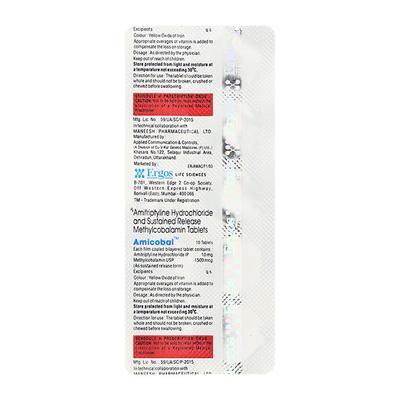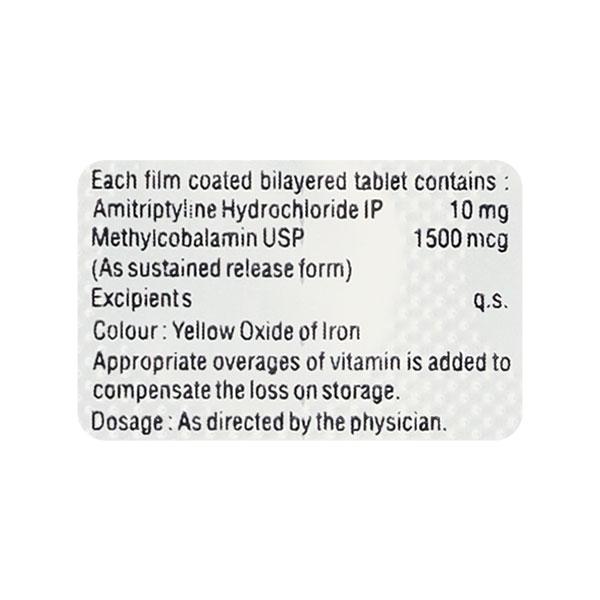

Netmeds First Membership
Quick Links
Introduction About AMICOBAL TABLET
AMICOBAL TABLET is a combination of Amitriptyline and Methylcobalamin, which belong to a group of medicines called Tricyclic antidepressants and Vitamins, respectively. It is used in the management of neuropathic pain which is a type of pain caused by damage or injury to the nerves that transfer information between the brain and spinal cord from the skin, muscles and other parts of the body which is generally characterized by symptoms such as spontaneous pain which may be of shooting, burning, stabbing or electric shock-like pain, with tingling and numbness feeling.
Avoid taking AMICOBAL TABLET if you are allergic to Amitriptyline and Methylcobalamin or have a history of urinary retention due to enlargement of the prostate gland (benign prostatic hypertrophy), myocardial infarction (heart attack), congestive heart failure and/or impaired liver function.
Before taking AMICOBAL TABLET, inform your doctor if you have a history of seizures, blood dyscrasias, urinary retention, narrow-angle glaucoma (an eye disorder), increased intraocular (eye) pressure, an overactive thyroid, suicidal thoughts or kidney problems.
AMICOBAL TABLET is not recommended for use during pregnancy and in breastfeeding women; it is also not recommended for use in children and adolescents (below 18 years). The most common symptoms of taking AMICOBAL TABLET are sleepiness, drowsiness, shakiness of hands or other body parts, dizziness, headache, dry mouth and constipation. Consult your doctor if any of your symptoms get worse.
Uses Of AMICOBAL TABLET
- Management of neuropathic pain
How AMICOBAL TABLET Works
AMICOBAL TABLET helps to manage neuropathic pain, where amitriptyline increases the levels of certain chemical messengers (serotonin and noradrenaline) that stop the movement of pain signals in the brain and methylcobalamin helps in the production of myelin, a substance that protects the nerve fibres and rejuvenates damaged nerve cells, which together acting with amitriptyline provides relief from neuropathic pain due to damaged nerves.
How to use AMICOBAL TABLET
Take AMICOBAL TABLET as advised by your physician. Swallow AMICOBAL TABLET with a glass of water and do not chew or crush the medicine. Your doctor will decide the correct dose and duration for you depending on your age, body weight and disease condition.
Side Effects Of AMICOBAL TABLET
Common
- sleepiness
- drowsiness
- shakiness of hands or other body parts
- dizziness
- headache
- irregular, hard or rapid heartbeat
- dizziness due to low blood pressure (orthostatic hypotension)
- dry mouth
- constipation
- nausea
- excessive sweating
- weight gain
- slurred or slow speech
- aggression
- problem with the ability of the eye to change its focus from distant to near objects (and vice versa)
- congested nose
- confusion
- sexual disturbances (decreased sex drive, problems with erection)
- disturbance in attention
- changes in taste
- numbness or tingling sensation in the arms or legs
- disturbed coordination
- dilated pupils
- heart block
- weakness
- agitation
- urination disorders such as incontinence, kidney stones and kidney failure
- feeling thirsty
Uncommon
- excitement, anxiety, difficulty sleeping, nightmares
- convulsions (fits)
- tinnitus (ringing or buzzing noise in ears)
- increased blood pressure
- diarrhea
- vomiting
- skin rash, nettle rash, swelling of the face and tongue
- difficulties passing urine
- increased production of breast milk or breast milk outflow without breastfeeding
- increased pressure in the eyeball
- collapse conditions
- worsening of cardiac failure
- liver function impairment such as cholestatic liver disease
Rare
- decreased appetite
- delirium (especially in elderly patients)
- hallucinations
- abnormality in the heart's rhythm or heartbeat pattern
- swelling of the salivary glands
- hair loss
- increased sensitivity to sunlight
- breast enlargement in men
- fever
- weight loss
Stop taking AMICOBAL TABLET and contact your doctor if you experience any of the following side effects:
- signs of acute glaucoma (serious eye condition) such as attacks of intermittent blurring of vision, rainbow vision and eye pain
- signs of prolonged qt interval such as fast, chaotic heartbeats
- signs of the paralyzed intestine such as bad constipation, a swollen stomach, fever and vomiting
- signs of jaundice such as yellowing of the skin and the white in the eyes
- signs of blood or bone marrow effects such as bruising, bleeding, pallor or persistent sore throat and fever
- suicidal thoughts or behaviour
How To Manage Side Effects
Dizziness:
Try to rest, relax and get enough sleep. Try to avoid driving or operating any tools or machines while you are feeling dizzy. Limit your consumption of alcohol, as it can aggravate your dizziness. Consult and inform your doctor if the symptom does not improve.
Headache:
If AMICOBAL TABLET causes a headache, then take rest and drink plenty of fluids. Try to avoid drinking alcohol. Ask your doctor to recommend a painkiller. Paracetamol is safe to be taken with these medicines. Headaches should usually go away after the first week of taking AMICOBAL TABLET. If headaches last more than a week or are severe, inform your doctor.
Nausea and vomiting:
Try to take AMICOBAL TABLET with or just after a meal or a snack. Stick to simple meals. Avoid eating rich or spicy food. Consult your doctor if the symptom gets worse.
Constipation:
Try to eat more high-fiber foods, such as fresh fruit, vegetables and cereals and drink plenty of water. Try doing exercise regularly (going for a daily walk or run). If this does not help, inform your doctor about receiving alternate managements for constipation.
Diarrhea:
Drink lots of fluids, such as water, to keep yourself hydrated. Try to avoid taking any medicine to manage diarrhoea. Consult your doctor if the symptom worsens.
Warning & Precautions
Pregnancy
AMICOBAL TABLET is not recommended for use during pregnancy or in women with childbearing potential. Consult your doctor before taking AMICOBAL TABLET.
Breastfeeding
AMICOBAL TABLET is not recommended for use in breastfeeding women. Consult your doctor before taking AMICOBAL TABLET.
Driving and Using Machines
AMICOBAL TABLET might cause dizziness or drowsiness. If you experience these side effects, try to avoid driving or operating heavy machines. Consult your doctor before taking AMICOBAL TABLET.
Alcohol
Avoid consumption of alcohol while taking AMICOBAL TABLET since it increases the sedative effect.
Kidney
AMICOBAL TABLET should be used with caution in patients with kidney problems such as renal failure. Consult your doctor before taking AMICOBAL TABLET.
Liver
AMICOBAL TABLET is not recommended for use in patients with impaired liver function. Consult your doctor before taking AMICOBAL TABLET.
Allergy
AMICOBAL TABLET is not recommended for use if you are allergic to Amitriptyline, Methylcobalamin or any other ingredients of this medicine.
Heart Disease
AMICOBAL TABLET is not recommended for use if you have heart diseases such as myocardial infarction (heart attack) and congestive heart failure. Consult your doctor before taking AMICOBAL TABLET.
Others
AMICOBAL TABLET is not recommended for use if you:
- have a history of urinary retention due to enlargement of the prostate gland (benign prostatic hypertrophy)
Before taking AMICOBAL TABLET, inform your doctor if you:
- have a history of seizures
- have a history of blood dyscrasias
- have a history of urinary retention
- have a history of narrow-angle glaucoma
- have a history of increased intraocular pressure
- have hyperthyroidism
- have suicidal thoughts
Use in Pediatrics:
AMICOBAL TABLET should be used with caution in children and adolescents (below 18 years). Consult your doctor before taking AMICOBAL TABLET.
Use in Geriatrics:
AMICOBAL TABLET should be used with caution in elderly patients (aged 65 years or above). Consult your doctor before taking AMICOBAL TABLET.
Interactions
A. Drug-Drug Interactions:
Before taking AMICOBAL TABLET, inform your doctor, if you are taking any of the following medicine:
- guanethidine (a medicine used to manage hypertension)
- anticholinergic agents (a medicine used to manage overactive bladder) Ex. atropine, belladonna alkaloids, benztropine mesylate
- sympathomimetic drugs (medicines used to manage glaucoma, anaphylactic shock, chronic obstructive pulmonary disease) Ex. benzphetamine, ritodrine
- cimetidine (a medicine used to manage ulcers)
- ethchlorvynol (a medicine used to manage insomnia)
- barbiturates (a medicine used to manage seizures)
- neomycin (a medicine used to manage or manage bacterial skin infections)
- aminosalicylic acid (a medicine used for tuberculosis)
- H2- blockers (a medicine used for gastric ulcers) Ex. famotidine, nizatidine and ranitidine
- colchicine (a medicine used to manage inflammation and pain)
- oral contraceptives (a medicine used for birth control) such as sprintec, taytulla
- parenteral chloramphenicol (a medicine used for superficial eye infections)
Overdosage:
If you or anyone else accidentally takes too much of AMICOBAL TABLET, consult your doctor immediately or visit the nearby hospital. Symptoms of overdose are temporary confusion, disturbed concentration or transient visual hallucinations, hypothermia (a dangerous drop in temperature), drowsiness, fast heart rate, bundle branch block, congestive heart failure, dilated pupils, disorders of ocular motility (eye movement), convulsions, severe low blood pressure, stupor (state of unconsciousness), coma, polyradiculoneuropathy (autoimmune disorder); constipation, agitation, muscle rigidity, overactive reflexes, high fever and vomiting.
Synopsis
| Drug | : | Amitriptyline, Methylcobalamin |
| Pharmacological Category | : | Tricyclic antidepressants and Vitamins |
| Therapeutic Indication | : | Neuropathic pain |
| Dosage Forms | : | Tablet |
More Information
- Keep the medicine out of reach from children
- Store AMICOBAL TABLET at room temperature
FAQs About AMICOBAL TABLET
Q: What is the function of AMICOBAL TABLET?
AMICOBAL TABLET is used in the management of neuropathic pain, which is a type of pain caused by damage or injury to the nerves that transfer information between the brain and spinal cord from the skin, muscles and other parts of the body.
Q: Who should avoid taking AMICOBAL TABLET?
A: AMICOBAL TABLET is not recommended for use in patients who are allergic to Amitriptyline and Methylcobalamin, have a history of urinary retention due to enlargement of the prostate gland (benign prostatic hypertrophy), myocardial infarction (heart attack), congestive heart failure, impaired liver function or are pregnant or breastfeeding women.
Q: What side effects are seen with AMICOBAL TABLET?
A: The most common symptoms of taking AMICOBAL TABLET are sleepiness, drowsiness, shakiness of hands or other body parts, dizziness, headache, dry mouth and constipation. Consult your doctor if any of these symptoms get worse.
Q: Is it safe to drive after taking AMICOBAL TABLET?
A: AMICOBAL TABLET might cause dizziness or drowsiness. If you experience these side effects, try to avoid driving or operating heavy machines. Consult your doctor before taking AMICOBAL TABLET.
Q: What happens if you take more AMICOBAL TABLET than your required dose?
A: If you or anyone else accidentally takes too much AMICOBAL TABLET, consult your doctor immediately or visit the nearby hospital. Symptoms of overdose are temporary confusion, disturbed concentration, visual hallucinations, hypothermia (a dangerous drop in temperature), drowsiness, a fast heart rate, congestive heart failure, dilated pupils, convulsions, severe low blood pressure, stupor (state of unconsciousness), coma, constipation, agitation, muscle rigidity, overactive reflexes, a high fever and vomiting.
References
1. KD Tripathi. Drugs Used in Mental Illness: Antidepressant and Antianxiety Drugs & Haematinics and Erythropoietin. Essentials of medical pharmacology. Seventh edition. 2013. Page – 464 & 608.
2. EpiCept Corporation.A Study of the Efficacy and Safety of Amitriptyline/Ketamine Topical Cream in Patients With Diabetic Peripheral Neuropathy. NIH U.S. National Library of Medicine ClinicalTrials.gov. [Revised in May 2011] [Accessed on 7th June 2022] https://clinicaltrials.gov/ct2/show/NCT00476151
3. Clair Haslam and Turo Nurmikk. Pharmacological treatment of neuropathic pain in older persons. NIH National Library of Medicine, National center for biotechnology information. PMC PubMed Central. March 2008. [Accessed on 7th June 2022] https://www.ncbi.nlm.nih.gov/pmc/articles/PMC2544357/
4. Brown & Burk UK Ltd. Electronic medicines compendium (EMC). [Revised in January 2022] [Accessed on 7th June 2022] https://www.medicines.org.uk/emc/files/pil.10850.pdf
5. The madras pharmaceuticals. Am Nursing Tablets. [Revised in January 2022] [Accessed on 7th June 2022] https://www.centaurpharma.com/downloads/2022/neurology/Am-Nuring.pdf
Useful Diagnostic Tests
- Cryoglobulins
- Cerebrospinal fluid analysis








